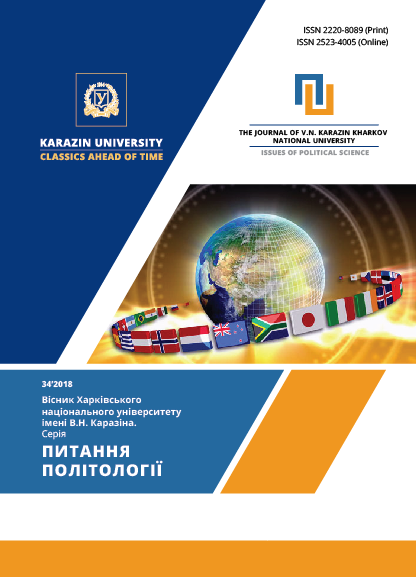POLITICAL IDEOLOGIES AS CONCEPTS’ SPHERES: POSSIBILITIES OF AN INTERDISCIPLINARY COGNITIVE-DISCURSIVE ANALYSIS
Abstract
Consideration of different possibilities and opportunities for researching ideologies as concepts’ spheres that is as a complex bundle of concepts of different types, together with distinct structures of concepts’ fields and interrelations between them is provided. Such an understanding of political ideologies would enable analysts to apply a cognitive-discursive research framework comprised of a number of different scientific disciplines: first and foremost is based on political science expert knowledge in the realm of political concepts and cognitive linguistics which actually harbors cognitive-discursive research framework; second – sociology and cognitive sciences, and the third – discourse analysis. Political ideologies as concepts’ spheres are methodologically defined using the morphological approach to ideologies developed by M. Freeden, which allows comparing the core-periphery structure of an ideology with the concept of carcass (framework) and its variables within the cognitive approach. Based on a number of illustrative examples, it is proved that in order to understand how ideologies influence the perception of people one needs to analyze spheres and fields of concepts as cognitive schemes. An application of discourse analysis to analyze both the levels and structures of the spheres of concepts, but also to trace the formation and practical use of the ideological cognitive schemes, is advocated. However it is suggested that social science component should be researched on its own, i.e. separately from the cognitive side of a given sphere of concepts in order to grasp the ways ideological discourses are perceived on cognitive level. The concept of «the political self» is also mentioned in the context of researching the process of political socialization which is inevitable influenced by a number of social and cognitive factors. An example of how literature studies can be applied to study ideologies and even form a typology of them is also provided, opening a door for further discussions and studies into possibilities of creating an interdisciplinary framework of researching political ideologies as spheres of concepts.
Downloads
References
Приходько, Антон. 2013. Концепты и концептосистемы. Днепропетровск: Белая Е. А.
Косенко, Анна. 2009. “До проблеми дефініції концепту як стрижневого об’єкту мовознавчих розвідокˮ, Наукові записки Національного університету "Острозька академія», Серія: Філологічна 11: 234-239.
Воробйова, Ольга. 2011. “Концептологія в Україні: здобутки, проблеми, прорахунки”, Вісник КНЛУ, Серія: Філологія. 14 (2): 53-64.
Стасюк, Тетяна. 2013. “Нові тенденції розвитку термінознавства: здобутки міжнародної наукової групи Р. Теммерман”, Термінологічний вісник. 2 (1): 28-49.
Михайлович-Гетто, О. 2007. “Конотація квазітерміна в рекламному тексті: співвід-ношення індивідуального та колективного”, Вісник СумДУ, Серія “Філологія”. 1 (1): 156-160.
Продан, Юлія. 2013. “Поняття “термін-фразема” у лінгвістиці”. Термінологічний вісник 2 (1): 116-121.
Сорока, Юлия. 2010. Видеть, мыслить, различать: социокультурная теория восприя-тия. Харьков: ХНУ имени В. Н. Каразина.
Кулик, Володимир. 2010. Дискурс українських медій: ідентичності, ідеології, владні стосунки. Київ: “Критика”.
Goertz, Gary. 2006. Social Science Concepts. A User’s Guide. Princeton University Press.
Richter, Marcus. 1995 “The History of Political and Social Concepts: A Critical Introduction”. New-York: Oxford University Press.
Freeden, Michael. 1998. Ideologies and Political Theory: A Conceptual Approach. Oxford: Oxford University Press.
Єрмоленко, Володимир. 2018. Плинні ідеології. Ідеї та політика в Європі XIX-XX століть. Київ: ДУХ І ЛІТЕРА.
Beyme von, Klaus. 2006. Die politischen Theorien der Gegenwart. Wiesbaden: VS Verlag für Sozialwissenschaften.
Naschold, Frieder, 1970. Politische Wissenschaft. München: Verlag Karl Alber.
Фоґт, Маркус. 2014. Социал-дарвинизм. Научная теория, политический и теологический аспекты эволюционной теории. Ужгород: ФОП Бреза.
Deppe, Frank. 2014. Imperialer Realismus? Deutsche Außenpolitik: Führungsmacht in “neuer Verantwortung“. Hamburg-Bad Langensalza: Beltz.
Abdel-Samad, Hadel. 2015. Der islamische Faschismus. München: CPI Books.
Романчук, Роман. 2010. Либерализм. Идеология счастливого человека. Киев: К.И.С.
Dowson, Richard, Prewitt, Kenneth. 1969. Political Socialization, Boston: Little brown and company.
Ștefănescu, Bogdan. 2012. Postcommunism/ Postcolonialism: Siblings of Subalternity. București: Universității din București.
Author’s copyright and licensing.
License Terms: Authors retain copyright and also grant the Journal the right to publish original scientific articles that contain research results and are not under consideration for publication in other issues. All material is licensed under a Creative Commons Attribution License International CC-BY, which allows others to distribute their work with the copyright of this work and recognition of the first publication in this Journal.
If the article is taken for publishing in The Journal of V.N. Karazin Kharkiv National University. “Political Science Issues”, the author must sign a copyright transfer agreement. The agreement is sent by post (original document) or by e-mail (scanned copy of the document) to the Editorial Board of the Journal.
By this agreement the author certifies that the submitted material:
- does not violate the copyrights of other people or organizations;
- has not been previously published in other issues and has not been given for publishing to other issues.
The author gives the editorial board the rights to:
- publish the article in Ukrainian (English) and distribute its printed version;
- translate the article into English (for articles in Ukrainian) and distribute the printed version of the translation;
- distribute the electronic version of the article, as well as the electronic version of the English-language translation of the article (for articles in Ukrainian and Russian), through any electronic means (placing on the official journal web site, in electronic databases, repositories, etc.).
The author reserves the right without the consent of the editorial board and the founders to:
- Completely or partly use the materials of the article for educational purposes.
- Completely or partly use the materials of the article for writing own theses.
- Use the materials of the article to prepare abstracts, conference reports, and oral presentations.
- Post electronic copies of the article (including the final electronic version downloaded from the journal's official website) to:
- personal web-resources of all authors (web sites, web pages, blogs, etc.);
- web-resources of institutions where authors work (including electronic institutional repositories);
- non-profit, open-source web resources (such as arXiv.org).




